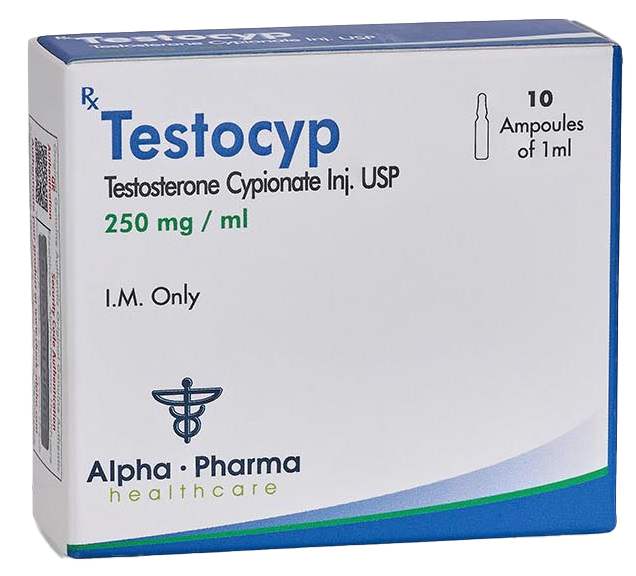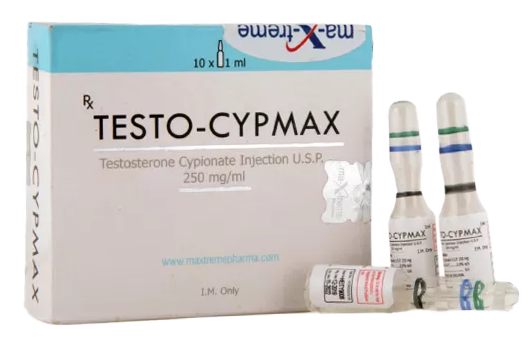
Introduction to Testosterone Cypionate
Testosterone Cypionate is a widely used testosterone replacement therapy, particularly in the treatment of hypogonadism in men. As a long-acting form of testosterone, this medication helps in replenishing testosterone in those who have low levels due to various health conditions.
The Science Behind Testosterone Cypionate
Testosterone Cypionate is a synthetic form of testosterone, a crucial hormone primarily produced in the testes of men and in smaller quantities in the ovaries of women. It plays a pivotal role in various physiological processes in both genders, including the development of secondary sexual characteristics, muscle mass maintenance, bone density regulation, and overall well-being.
Here’s a more detailed explanation of how Testosterone Cypionate works:
Hormone Production and Regulation:
In a healthy individual, the body’s endocrine system regulates the production of testosterone. The hypothalamus in the brain detects when testosterone levels are low and signals the pituitary gland to release luteinizing hormone (LH). LH, in turn, stimulates the Leydig cells in the testes (in men) or the ovaries (in women) to produce testosterone. This system maintains a delicate hormonal balance.
Clinical Deficiency:
Some individuals, however, may experience a deficiency in testosterone production due to various factors such as aging, medical conditions, or hormonal imbalances. When testosterone levels fall below the normal range, it can lead to symptoms test cyp cycle like reduced libido, muscle weakness, fatigue, mood changes, and decreased bone density. This condition is known as hypogonadism.
BUY TESTOCYP FOR SALE
Only Safe Payments
5/5
BUY NOW

Supplementation:
Testosterone Cypionate is used as a form of hormone replacement therapy (HRT) to address hypogonadism. It works by supplementing the body with exogenous (external) testosterone. The cypionate ester attached to the testosterone molecule in Testosterone Cypionate allows for a slow and controlled release of the hormone into the bloodstream after injection.
Long-Lasting Action:
The cypionate ester prolongs the duration of action of Testosterone Cypionate compared to natural testosterone. After injection, the ester is gradually cleaved from the testosterone molecule by enzymes in the body. This slow release results in a sustained and stable elevation of testosterone levels in the blood over a period of about 7 to 14 days. This long-lasting effect means that individuals receiving Testosterone Cypionate injections typically require less frequent dosing compared to other forms of testosterone therapy.
Symptom Relief:
By supplementing the body with testosterone, Testosterone Cypionate helps restore testosterone levels to within the normal range, alleviating the symptoms associated with testosterone deficiency. This can lead to improved mood, increased energy, enhanced muscle development, and increased bone density. It can also have positive effects on sexual function and overall quality of life.
It’s important to note that Testosterone Cypionate should only be used under the supervision of a healthcare provider and prescribed to individuals with clinically diagnosed testosterone deficiencies. Misuse or abuse of this hormone can lead to adverse effects and potential health risks. Regular monitoring of hormone levels and overall health is essential during testosterone replacement therapy to ensure its safety and effectiveness.
Benefits of Medically Supervised Testosterone Cypionate Therapy

Medically supervised Testosterone Cypionate therapy, often administered in dosages like 200mg, provides numerous benefits for individuals with clinically diagnosed testosterone deficiency (hypogonadism). These benefits can only be safely achieved and closely monitored in a medical setting:
Optimal Dosage and Monitoring:
Under medical supervision, healthcare providers carefully assess an individual’s hormone levels and overall health to determine the appropriate dosage of Testosterone Cypionate. Regular monitoring ensures that treatment remains tailored to the individual’s specific needs.
Improved Muscle Mass:
Testosterone is crucial for muscle development and maintenance. Medically supervised therapy can lead to an increase in lean muscle mass and strength, addressing muscle loss associated with low testosterone levels.
Enhanced Mood and Energy Levels:
Testosterone deficiency often leads to symptoms such as fatigue, irritability, and mood swings. Medically supervised therapy can result in improved mood, increased energy levels, and an overall sense of well-being, which can positively impact mental health and quality of life.
Better Sexual Function:
Testosterone plays a critical role in sexual function, affecting libido and erectile function in men. Testosterone Cypionate therapy, when medically supervised, can help restore sexual desire and improve sexual performance, enhancing overall sexual satisfaction.
Bone Health:
Adequate testosterone levels are essential for maintaining bone density and strength. Medical supervision ensures that Testosterone Cypionate therapy can help prevent or slow down bone loss, reducing the risk of conditions like osteoporosis.
Cardiovascular Health:
Some research suggests potential cardiovascular benefits of testosterone replacement therapy, including improved lipid profiles and reduced insulin resistance. However, the cardiovascular effects of this therapy are still being studied and must be closely monitored under medical supervision.
BUY TESTO-CYPMAX FOR SALE
100% Authentic Product
5/5
BUY NOW

Individualized Treatment Plans:
Medically supervised therapy takes into account each patient’s unique needs and health status, resulting in personalized treatment plans. Regular follow-up appointments and ongoing monitoring allow healthcare providers to make necessary adjustments to dosages and address any potential side effects.
Safety and Risk Management:
Testosterone therapy carries potential risks and side effects, such as polycythemia (increased red blood cell count) and fluid retention. Medical supervision ensures that these risks are minimized, and any adverse effects are promptly addressed.
Legal and Ethical Considerations:
Medically supervised Testosterone Cypionate therapy adheres to legal and ethical standards, ensuring that treatment is prescribed and administered appropriately and in compliance with medical guidelines.
Understanding Testosterone Cypionate Dosages and Administration

Understanding the dosages and administration of Testosterone Cypionate is crucial for ensuring safe and effective hormone replacement therapy. Here’s a detailed explanation of these important aspects:
Dosages of Testosterone Cypionate: Individualized Approach:
The dosage of Testosterone Cypionate is not one-size-fits-all. Instead, it is customized for each individual based on their specific medical condition, testosterone levels, age, overall health, and treatment goals.
Baseline Assessment:
Before starting Testosterone Cypionate therapy, healthcare providers conduct a comprehensive evaluation that includes blood tests to measure the individual’s baseline testosterone levels. This assessment helps determine the extent of testosterone deficiency and guides the dosage selection.
Common Dosages:
While dosages can vary significantly, a commonly used initial dose of Testosterone Cypionate 200mg is administered every 1 to 2 weeks. However, some individuals may require higher or lower doses based on their specific needs.
Adjustments Over Time:
Dosages may be adjusted over the course of treatment. Healthcare providers monitor hormone levels and assess the individual’s response to therapy during follow-up appointments. Dosage adjustments ensure that testosterone levels are within the normal range clomid for sale and that symptoms of deficiency are adequately addressed.
Administration of Testosterone Cypionate: Healthcare Professional:
Testosterone Cypionate 200mg is typically administered through intramuscular injections. These injections are most commonly administered by a trained healthcare professional, such as a physician or nurse, in a clinical setting. This ensures proper technique and reduces the risk of complications.
Injection Sites:
The most common injection sites for Testosterone Cypionate are the gluteal muscles (buttocks) or the deltoid muscle (shoulder). The choice of injection site depends on the healthcare provider’s preference and the individual’s comfort.
Injection Frequency:
The frequency of injections can vary. While the standard practice is often to administer Testosterone Cypionate 200mg every 1 to 2 weeks, some healthcare providers may recommend more frequent or less frequent injections based on the individual’s response and hormone levels.
Intramuscular Injection Technique:
Intramuscular injections involve inserting a needle deep into the muscle tissue to ensure proper absorption of the medication. Healthcare professionals follow sterile techniques to minimize the risk of infection.
Patient Education:
Individuals receiving Testosterone Cypionate 200mg therapy should receive thorough education on the injection process, including proper technique for self-administration if applicable. They should also be aware of potential side effects and how to monitor and report them to their healthcare provider.
Regular Monitoring:
Throughout the course of therapy, healthcare providers schedule regular follow-up appointments to monitor the individual’s progress. Blood tests are typically conducted to assess testosterone levels, hematocrit (red blood cell count), and other relevant markers to ensure both safety and effectiveness.
Safety Considerations:
Testosterone Cypionate 200mg is a controlled substance, and its use must adhere to legal and ethical guidelines. It should only be prescribed and administered for clinically diagnosed cases of testosterone deficiency under the care of a qualified healthcare provider.
Potential Side Effects and Risks
Certainly, Testosterone Cypionate therapy can bring about significant benefits, but it is essential to be aware of the potential side effects and risks associated with this treatment. Here’s a detailed exploration of the various side effects and risks:
Common Side Effects:
Acne: Testosterone therapy can stimulate sebaceous gland activity, leading to an increased risk of acne, especially in individuals prone to this skin condition. Proper skincare can help manage this side effect.
Fluid Retention: Some individuals may experience fluid retention, leading to swelling, particularly in the ankles and feet. This can be managed through dietary and lifestyle adjustments or dosage adjustments.
Mood Changes: While testosterone therapy can improve mood in many cases, some individuals may experience mood swings, increased irritability, or even mood disorders like depression or anxiety. Monitoring and adjusting the treatment plan can help manage these symptoms.
Changes in Sexual Desire:
Increased Libido: One of the desired effects of testosterone therapy is an increase in sexual desire and improved sexual function. However, this can vary among individuals.
Reduced Libido: Paradoxically, some individuals may experience a decrease in libido as their testosterone levels rise. This is less common but can occur.
Cardiovascular Risks:
Heart Disease: There is ongoing debate and research about the potential impact of testosterone therapy on heart health. Some studies have suggested an increased risk of heart disease, while others have not found a significant association. The cardiovascular effects of testosterone therapy should be closely monitored, especially in individuals with pre-existing heart conditions.
Hematological Effects:
Polycythemia: Testosterone therapy can stimulate the production of red blood cells, potentially leading to a condition known as polycythemia. This can increase the risk of blood clots and other cardiovascular complications. Regular monitoring of hematocrit levels is essential, and dosage adjustments may be required to manage this risk.
Liver Problems:
Liver Toxicity: Although rare, there have been reports of liver problems associated with testosterone therapy. These include liver tumors or damage to the liver. Routine liver function tests are typically performed to monitor for such issues.
Sleep Apnea:
Testosterone therapy may worsen sleep apnea or contribute to its development in individuals at risk. Sleep patterns and symptoms should be closely monitored, especially in those with known sleep apnea.
Skin and Hair Changes:
Hair Loss: Some individuals may experience male-pattern baldness or increased hair thinning as a side effect of testosterone therapy.
Hirsutism: In women, testosterone therapy may lead to excessive hair growth, often on the face and body.
Psychological Effects:
Mental Health: There is a potential for mood changes, including increased irritability or mood swings. Individuals with a history of mental health issues should be monitored closely.
Infertility:
Testosterone therapy can suppress sperm production in men, potentially leading to infertility. If fertility preservation is a concern, alternative treatments or approaches may need to be considered.
Legal and Ethical Considerations
Understanding the legal and ethical considerations surrounding the purchase and use of Testosterone Cypionate is crucial, especially given the strict regulation of this medication due to its potential for misuse and abuse. Here’s a detailed exploration of these aspects:
Prescription Requirement:
Testosterone Cypionate, a controlled substance in many countries, including the United States, can only be legally obtained with a valid prescription from a licensed healthcare provider. The prescription is necessary to ensure the medication is used appropriately for testosterone replacement therapy (TRT) in individuals with medically confirmed testosterone deficiency.
Medical Necessity:
The ethical principle underlying the prescription requirement is that Testosterone Cypionate should only be used for legitimate medical needs, such as in cases of hypogonadism. The goal of TRT is to normalize testosterone levels and alleviate deficiency symptoms, underlining the importance of medical evaluation and oversight.
Risks of Online Purchases:
The risks associated with obtaining Testosterone Cypionate without a valid prescription, especially through online sources offering testosterone cypionate for sale, are significant. Many of these sources operate illegally and may provide counterfeit or substandard products, posing serious health risks.
Health Risks of Misuse:
Using Testosterone Cypionate without medical supervision can lead to health risks like hormone imbalances, cardiovascular complications, and liver damage. This underscores the danger of self-administering testosterone or buying testosterone cypionate online without proper medical guidance.
Legal Consequences:
Acquiring or possessing Testosterone Cypionate without a prescription, including attempts to buy testosterone cypionate online, is illegal and can lead to severe legal consequences, such as fines or imprisonment. Such actions also carry risks related to the illegal distribution of controlled substances.
Ethical Considerations for Healthcare Providers:
Healthcare providers are ethically obligated to follow medical standards when prescribing Testosterone Cypionate. This includes conducting thorough assessments, monitoring treatment, and ensuring that the therapy is medically indicated.
Patient Responsibility:
Patients also hold ethical responsibilities regarding Testosterone Cypionate therapy. They should be transparent with their healthcare providers and adhere to prescribed dosages and follow-up schedules to ensure safe and effective treatment.
Considering the increasing trend of testosterone cypionate 200mg for sale online, it’s vital to highlight the legal and ethical risks associated with purchasing and using this controlled substance outside the established medical guidelines and without a prescription.
Conclusion
Testosterone Cypionate is a powerful medication that, when used under medical supervision, can offer significant benefits to those with testosterone deficiency. However, it is imperative to approach its use with caution, adhering to legal and ethical guidelines. Always consult with a healthcare professional before considering any form of testosterone therapy.